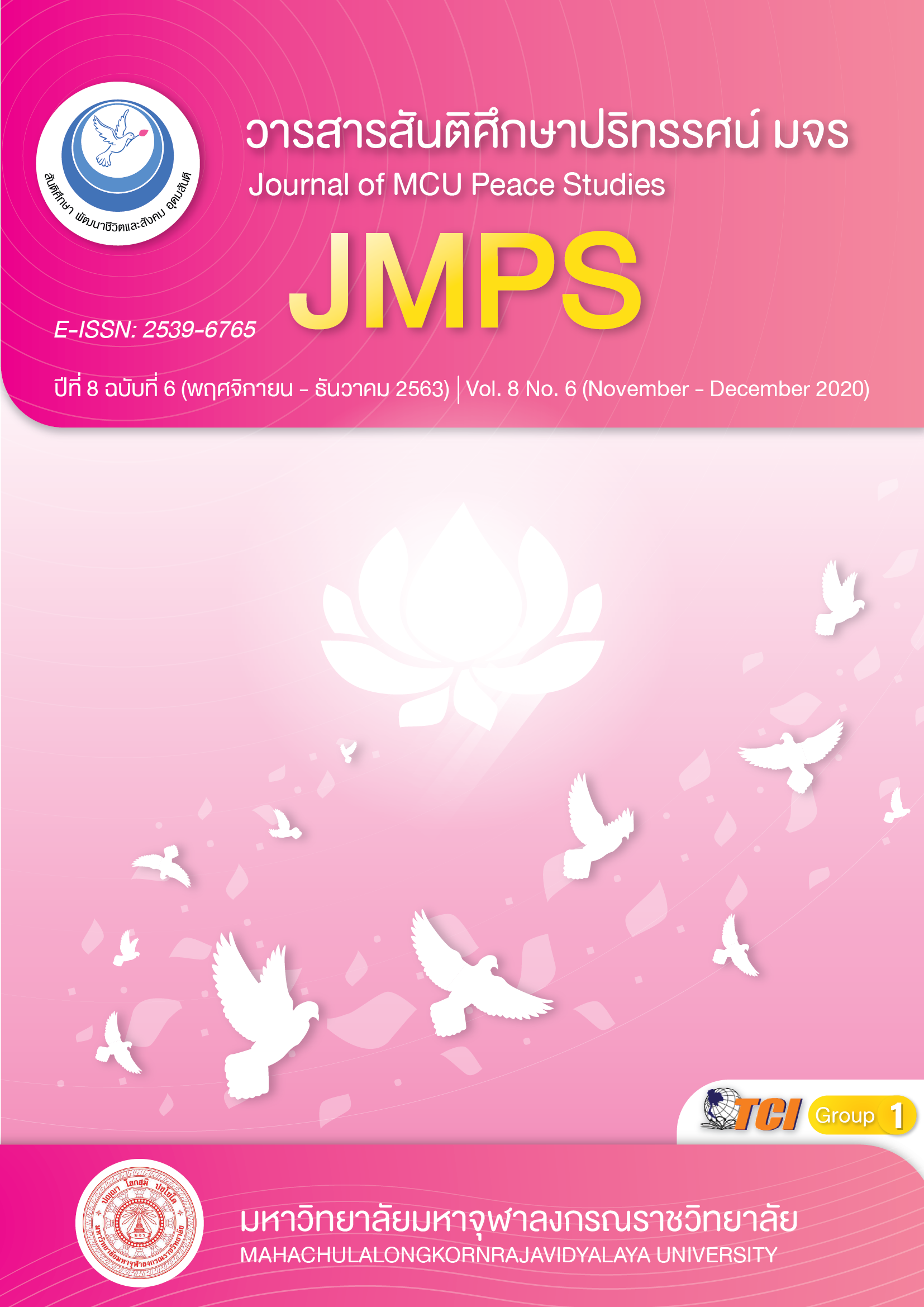ปรัชญาเศรษฐกิจพอเพียงกับการขับเคลื่อนหน่วยอบรมประชาชนประจำตำบล (อ.ป.ต.) ในการพัฒนาสังคมเชิงพุทธบูรณาการภายใต้การขับเคลื่อนตามแนวประชารัฐ
Main Article Content
บทคัดย่อ
บทความวิจัยเชิงปฏิบัติการนี้มีวัตถุประสงค์เพื่อนำเสนอการประยุกต์ใช้ปรัชญาเศรษฐกิจพอเพียงกับการขับเคลื่อนหน่วยอบรมประชาชนประจำตำบล (อ.ป.ต.) ในการพัฒนาสังคมเชิงพุทธบูรณาการภายใต้ การขับเคลื่อนตามแนวประชารัฐ โดยการสัมภาษณ์เชิงลึกกับผู้ให้ข้อมูลสำคัญ จำนวน 25 รูปหรือคน สนทนากลุ่มเฉพาะกับผู้เชี่ยวชาญ 9 รูปหรือคน การจัดการอบรมเชิงปฏิบัติการของแกนนำหน่วยอบรมประชาชนประจำตำบล (อ.ป.ต.) ในจังหวัดนครสวรรค์ 100 รูปหรือคน และใช้เทคนิคการวิเคราะห์เนื้อหาเชิงพรรณนา ผลการวิจัยพบดังนี้ 1) การยกระดับการพัฒนาเพื่อให้ประชาชนรักษาศีลหรืออธิศีลสิกขา โดย การพัฒนาด้านศีลธรรมและวัฒนธรรม คือ การยกระดับโครงการหมู่บ้านรักษาศีล 5 โครงการครูพระสอนศีลธรรมในโรงเรียนและนอกโรงเรียน การยกระดับการขับเคลื่อนธรรมนูญสุขภาพพระสงฆ์ตามหลักสูตร พระคิลานุปัฏฐากการยกระดับโครงการเกษตรวิถีพุทธ การแปรรูปสินค้าเกษตร และการยกระดับโครงการวัด ประชา รัฐ สร้างสุข 2) การยกระดับการพัฒนาเพื่อให้ประชาชนพัฒนาสมาธิหรืออธิจิตสิกขา โดยการพัฒนาด้านการเสริมสร้างสันติสุข คือ การยกระดับโครงการแผ่นดินธรรม แผ่นดินทอง โครงการแบ่งปันน้ำใจช่วยเหลือผู้ป่วยติดเตียงและผู้ยากไร้ โครงการคนไทยหัวใจกตัญญู 3) การยกระดับการพัฒนาเพื่อให้ประชาชนพัฒนาปัญญาหรืออธิปัญญาสิกขา โดยการพัฒนาในด้านการศึกษาสงเคราะห์ คือ การยกระดับและขับเคลื่อนพัฒนากองทุน “บุญนิธิเพื่อการศึกษา” เพื่อระดมทุนและมอบทุนการศึกษาแก่พระภิกษุ สามเณร และเยาวชนลูกหลานชาวบ้านชาววัด
Article Details
ทัศนะและความคิดเห็นที่ปรากฏในบทความในวารสาร ถือเป็นความรับผิดชอบของผู้เขียนบทความนั้น และไม่ถือเป็นทัศนะและความรับผิดชอบของกองบรรณาธิการ ยินยอมว่าบทความเป็นลิขสิทธิ์ของวารสาร
เอกสารอ้างอิง
Maneedech, P. (2007). An Analysis of Mrs.Thongdee Phothiyong's achievement in community development from a buddhist view. (Research Report). Center for the Promotion of National Strength on Moral Ethics and Values (Moral Center): office of Knowledge Management and Development (Public Organization).
Nakhon Sawan Deputy Dean Office (Propagation and Facilities Division). (2016). Strategic Plan for the Development of Tambon Training Unit Phase 1 (2016-2013 C.E.) of Nakhon Sawan clergy. Nakhon Sawan: Watworanat Banphot.
Panyasing, S. (2014). Self-Development and Indicators of Farming Families’ Well-Being in Accordance with Sufficiency Economy Philosophy Approach in Northeast Thailand. Journal of Humanities and Social Sciences, Khon Kaen University, 31(3), 121-138.
Phiutongngam, S. (2014). Budhadhasa Bhikkhu and guidance of the ways to make a living. Journal of Humanities and Social Sciences, 6(2), 175-208.
Phrakhrupaladsuvattanamethakul (Chaiyan Surbkrapan). (2014). Integration of Modern Thais’ Ways of Life with Buddhist Ethics. Journal of Yanasangvorn Research Institues, 5(1), 1-10.
Phramaha Boonlert Intapanyo. (2016). The Five Precepts Vilage: Form and Process to Co-living Culture Promotion of Thai Society. (Research Report). Phra Nakhon Si Ayutthaya: Mahachulalongkornrajavidyalaya University.
Pinitlokakorn, N., & Nimanong, V. (2017). A Study of the teaching on Material Non-Attachment in the Intergraded Buddhist Perspective. Journal of Graduate Studies Review, 13(2), 237-249.
Rittidet, P., & Kaewart, P. (2016). Book reviews in Decode the philosophy of the sufficiency economy into teaching the thinking process. Journal of Research for Development Social and Community, Rajabhat Maha Sarakham University, 32(6), 187-192.
Sandhivadhan, M. (2015). Development of green and happiness society model in community based on religions in Ayutthaya province. Inthaninthaksin Journal, 10(1), 95-118.
Sintanapanya, A. (2016). Ethical of Children and Youth Victims of Social Problems. Buabandit Journal of Educational Administration, 16(1), 17-25.


